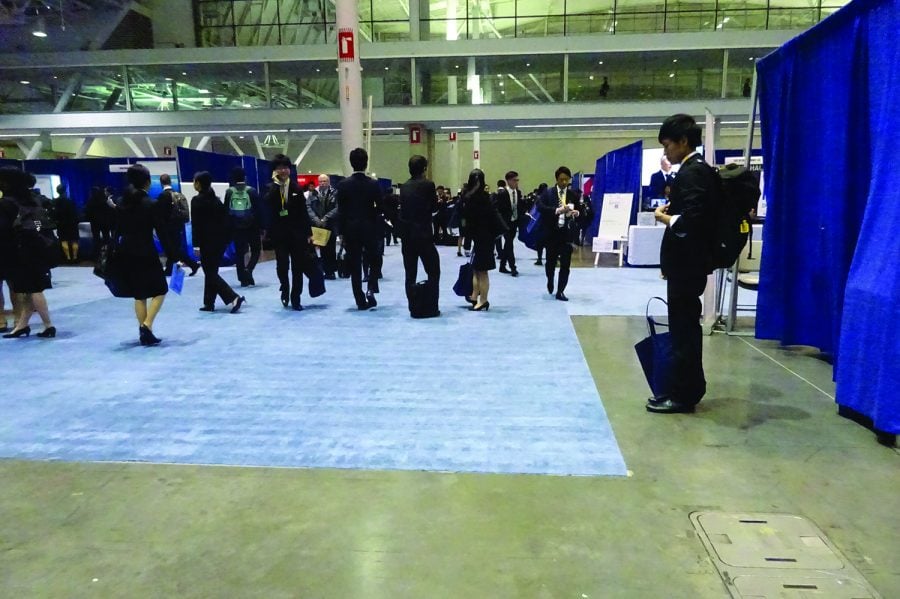Etsuo’s Corner: searching for jobs in Boston
On Nov. 18 at the Boston Convention and Exhibition Center, everyone wears black suits. It is a Japanese law where everyone that is looking for a job must wear a black suite.//Photo by Etsuo Fujita/The Guilfordian
Editor’s note: Etsuo’s Corner is a weekly column for World & Nation by Etsuo Fujita, an international student from Japan. Fujita features the stories of other international students or writes about his adventures and impressions as he learns about the cultures and customs of Guilford and his travels in America.
In this column, I would like to introduce how Japanese students get a job and my own experience with the process in Boston. There are many differences between here in the U.S. and Japan, which might be a product of cultural difference.
From Nov. 17 to Nov. 18, I went to Boston to look for a job. My first impression of Boston was the cold. Although I had expected low temperatures in the city, this was a different level for me, especially with the wind blowing so strongly. The reason I was in Boston for job hunting is because a lot of Japanese companies come to the city to hire Japanese students who have experienced studying abroad.
Recently, students who are multilingual are in high demand because many companies have opportunities for business abroad. For Japanese or non-western people, it can be difficult to acquire different languages because of their mother tongues. Below is what I learned in my Language Education class in Japan. English, Spanish and other western languages have the same ancestor and have similarities which make learning other western languages easier. Japanese, Chinese and Korean are completely different from other languages, which makes it difficult for those people to learn other languages. So, multilingual persons are rare and needed in this globalized society.
Approximately 20,000 Japanese students and more than 200 companies such as Toyota, Nikon, Goldman Sachs and MetLife came to the Boston Convention and Exhibit Center. I felt like I was in Tokyo because almost all of the students were Japanese and of course, we spoke Japanese there. In addition, I met some of my friends who attended the same university or high school as me. There, we had an opening meeting explaining information about the companies and about job interviews for those who applied. Some of my friends were offered a job, and I heard that about 20 to 30 percent of all students were offered a job. It was an annual meeting in Boston for Japanese students who are studying abroad, and there are more opportunities awaiting these Japanese students in Japan.
Next, I want to explain how Japanese students typically get a job in Japan, since this case of an annual Boston meeting is actually very unusual. As a note, Japanese students enter university in April and graduate in March. Usually, Japanese students start job hunting by preparing for an exam which we will take when we apply to companies, searching for companies and short-term internships at the second half term of junior year. Then, in March, they start applying to companies and job interviews are started around June.
The unique parts of job hunting in Japan is that internships are not necessary. Some companies accept long-term internships, such as 10 weeks, but short-term internships of one or two weeks are a lot more popular. Next, almost 70 percent of Japanese students work for companies immediately after they graduate from a university in April. Gap years or similar programs to prepare for work experience are not popular. The remaining 30 percent of university students usually go to graduate school, which is especially common for the science-focused students. Thirdly, the average student will apply to 50 companies, but some students apply to 100 or so.
In this style of job hunting, I feel the heavy presence of a Japanese collective style. For example, all students look for jobs in the exact same way. We wear black suits, and we cannot dye our hair. In addition, students do job hunting with the same process every year. They start job hunting at the same point, and many of them work after graduation. I’ve heard students in the U.S. have a lot more variation with gap years and several programs available. They might be able to find their own creative way to get a job.
I think there are pros and cons of Japanese job hunting, and one of the main cons for me is that I have to prepare for job hunting during my current exchange program. In addition, after going back to Japan, I will have to start the job hunting process immediately. While in the U.S., I want to see MLB games and visit other cities after my exchange program. But sadly, I can’t, because of job hunting.









